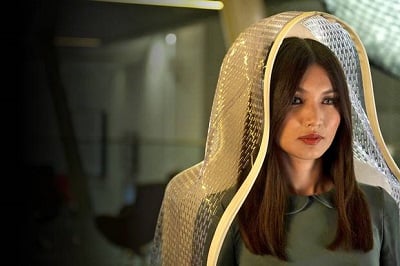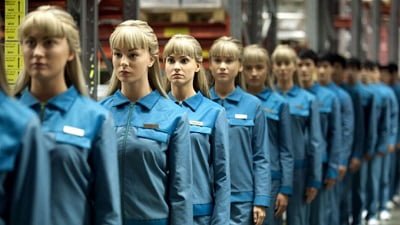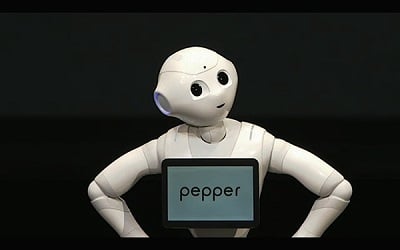Feature: Humans
October 1, 2015
[Image courtesy of primetime.unrealitytv.co.uk]
‘Humans’, the recent British-American science fiction drama incorporates an eclectic mix of genres as it glides seamlessly between quick witted comedy, terrifying dystopian concepts and emotionally complex relationships. Its enormous success was perhaps due to the fact that, unlike other sci-fi dramas which seem to be elaborate fantasies far from our own reality, ‘Humans’ hits home hard as it delves into the cynical attitudes towards Artificial Intelligence in a contemporary setting, questioning what it is that makes us human.
Artificial Intelligence is a term that was first coined in the 1950s and refers to computers that can simulate intelligence similar to humans. Having always been a cynic towards technology myself, and even more so in regard to the thought of computers that can think for themselves, I waited in anticipation of the TV show that would surely set all my sceptical views about AI in stone.

[Image courtesy of gizmodo.co.uk]
‘Humans’ focuses around the Hawkins family who buy a ‘synth’ (a human-like machine) named Anita to help around the house. Within the first episode, I felt suitably ignorant. As one character explains, “The best reason to make machines more like people is to make people less like machines…the woman in China who works 11 hours a day, stitching footballs; the boy in Bangladesh inhaling poison as he breaks up a ship for scrap; the miner in Bolivia risking death every time he goes to work—they can all be part of the past.”
In practice, this seems like the perfect solution; machines could replace monotonous and unpleasant labour, and there would be no need for people to risk their lives carrying out dangerous jobs. However, in ‘Humans’ we do not see this side to AI. Here we see synths being used in Western culture for prostitution, physical therapists and as family maids. We even witness the father – Joe Hawkins – flicking through the synth guide to the 18+ section, before engaging in sexual intercourse with Anita. This begs the question: has he cheated on his wife, or has he just performed a rather grotesque act on an inanimate object?

[Image courtesy of www.hollywoodreporter.com]
AI is often portrayed in dystopian dramas where robots take over the world in crude fashion. Fiction is therefore often the only reference point we have in regards to dystopian robot worlds; do we have a warped vision of what our technological future could look like, or are we staring down the barrel of one where humans could be inferior to their futuristic counterparts?
In our world, there are military robots being developed for battlefields: exoskeletons giving soldiers superhuman strength and robotic kit improving decision-making. Fictional film Star Wars presented C-3PO, the robot made to serve humans. Similarly, Pepper is an actual humanoid robot that went on sale in Japan this summer. Pepper is a social robot, able to converse with humans, recognise emotions and react to them accordingly. Pepper is advertised as an emotional companion; if he recognises that you are sad, he will try and cheer you up by playing your favourite song. Are humans really so emotionally stunted these days that we need a machine to tell us not to ‘worry ‘bout a thing cause every little thing gonna be alright’? Pepper is a terrifying and depressing culmination of what humankind has had to create. The synths from ‘Humans’ and character ‘Ava’ from the sci-fi film ‘Ex-Machina’ are perhaps the most feared type of AI: they look like humans. People have already experimented with creating human looking robots, whilst L’Oreal have collaborated with company Organovo to 3D print human skin to make androids even more lifelike.

[Image courtesy of metrocebu.com]
Our physical destruction at the (artificial) hands of these types of robots isn’t a major concern, but the way that they will interfere with our relationships is. We probably shouldn’t be too blasé about being physically destroyed either though. It is unlikely that a robot produced to work with humans will ever turn against them, but what about a robot built to destroy humans? There is a campaign to stop killer robots ever being produced and the UN have said no weapon should be operated without human control, but is a terrorist group going to take this warning seriously?
One of the sub-plots in ‘Humans’ revolves around the group of synths who are not just machines. Their creator gave them consciousness so that they can think and feel. Leo is a human who was made part-synth as a result of dying as a child and being brought back to life. Whilst Leo is still considered human, the synths are not. Yet, both have consciousness and both are synthetic. This raises questions about the nature of the human mind and whether there is something about it that is impossible to replicate. The ethics behind creating artificial beings endowed with human intelligence are complex; if the conscious synths are not considered human then what kind of rights do they have?

[Image courtesy of channel4.wikia.com]
The growth of technology is exponential, and it is this that makes it so frightening. A child’s PlayStation today is more powerful than a military supercomputer from 15 years ago. Most of us are uncomfortable with the speed of this kind of progression as it makes it difficult to predict our technological future. AI is crucial in the development of science and medicine: emergency departments use AI supercomputers that collect and analyse data from more than ¼ million patients from the last 30 years, every 3 minutes, and can diagnose patients before the doctor. It is pointless to shun AI and its uses as I once did, as they will inevitably be a part of your life. It is perhaps wiser to accept that AI cannot be ignored and is best used in tandem with human beings, not against them.
By Mary Pattisson
Filed under: Film, TV & Tech
Tagged with: artifical intelligence, channel 4, Humans, review, robots, TV



Comments